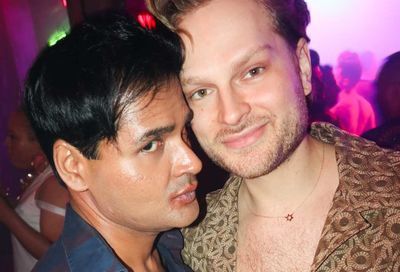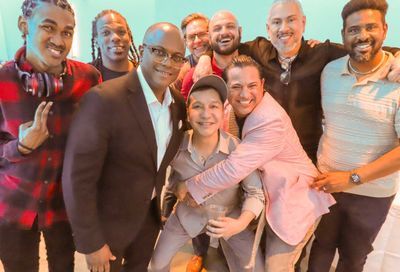The Next Step
Commentary: Center Field
He is the most gifted political figure in two generations. He ran a smart, disciplined and innovative campaign that made the most of his charisma, toughness and confidence. When hit with a possibly fatal compilation of inflammatory clips from his pastor, he rose to the occasion with a searching and luminous speech on race that dared to treat his audience like adults. He responded to the financial crisis with a calm deliberation that belied his adversaries’ charges of unreadiness. As he redrew the political map on Nov. 4, he gave our nation a moment of redemption that prompted dancing in the streets of the world.
In the process, Barack Obama showed the GLBT movement how to win. More on that shortly.
The other big news of the election — the revocation of marriage equality by California voters — has provoked plenty of drama, from massive marches to racial scapegoating. Some are claiming that the Nov. 15 protests across the country are the true start of the marriage-equality movement, but that is false. The flashpoint of Proposition 8, like Stonewall before it, galvanized large numbers of people, but in both cases the movement’s pioneers began laying the groundwork more than a decade before.
The racist recriminations directed by some against African Americans for the Proposition 8 vote were an awful counterpoint to Obama’s transformative victory. Some even blamed Obama for the result because of the increased turnout he generated, but Nate Silver of www.fivethirtyeight.com points out that new California voters actually opposed the initiative by 62 to 38 percent.
Furthermore, singling out African Americans out of all electoral subgroups for casting blame, aside from being monumentally counterproductive, ignores the fact that Proposition 8’s opponents included the California NAACP, the National Black Justice Coalition, the National Black Police Association, the National Congress of Black Women and many black pastors. That we lost — although the pro-gay numbers improved from 2000 — calls not for bitterness but for reassessment and recommitment.
Kathryn Kolbert, president of the People for the American Way Foundation, wrote on Nov. 7 about the far right’s wedge politics: ”The Religious Right has invested in systematic outreach to the most conservative elements of the Black Church, creating and promoting national spokespeople like Bishop Harry Jackson, and spreading the big lie that gays are out to destroy religious freedom and prevent pastors from preaching about homosexuality from the pulpit.”
Not only must GLBT advocates improve our own outreach efforts, we need to avoid playing into right-wing hands as we do when we denigrate religion and talk about taking away churches’ tax exemptions. We are too often reactive, while our adversaries are strategic. We need to catch up.
In the aftermath of Proposition 8, some in our community have resorted to bad old habits: ranking oppressions; referring to ”the LGBT Community” as if it were monolithic and distinct from the black, gay community; calling the marriage fight a ”white thing”; and making disparaging generalizations about one another instead of working to build trust.
Obama’s landmark campaign offers gay activists many lessons: Believe in yourself. Tell your story. Frame the issues rather than letting your adversaries frame them. Wrap yourself in faith, flag and family — the other side deserves no monopoly. Listen to people who disagree with you; you may find common ground and supporters in unexpected places. Do your homework. Organize in a way that motivates and empowers your volunteers. Speak to your listeners’ better angels instead of rebuking or pandering to them. Talk to voters like adults. Don’t flee from challenges — rise to them.
One who rose to the occasion on Nov. 15 was comedian and actress Wanda Sykes, who publicly came out at a Las Vegas rally, saying that the Proposition 8 supporters ”have galvanized a community. We are so together now and we all want the same thing and we are not gonna settle for less. Instead of having gay marriage in California, no, we’re gonna get it across the country. When my wife and I leave California, I want to have my marriage also recognized in Nevada, in Arizona, all the way to New York. … I am proud to be a woman, I’m proud to be a black woman and I’m proud to be gay.”
The source of progress is risking the next step, whatever that is for each of us. Yes we can.
Richard J. Rosendall is a writer and activist whose work has appeared on Salon.com and the Independent Gay Forum, www.indegayforum.org. He can be reached at rrosendall@starpower.net
Support Metro Weekly’s Journalism
These are challenging times for news organizations. And yet it’s crucial we stay active and provide vital resources and information to both our local readers and the world. So won’t you please take a moment and consider supporting Metro Weekly with a membership? For as little as $5 a month, you can help ensure Metro Weekly magazine and MetroWeekly.com remain free, viable resources as we provide the best, most diverse, culturally-resonant LGBTQ coverage in both the D.C. region and around the world. Memberships come with exclusive perks and discounts, your own personal digital delivery of each week’s magazine (and an archive), access to our Member's Lounge when it launches this fall, and exclusive members-only items like Metro Weekly Membership Mugs and Tote Bags! Check out all our membership levels here and please join us today!




















